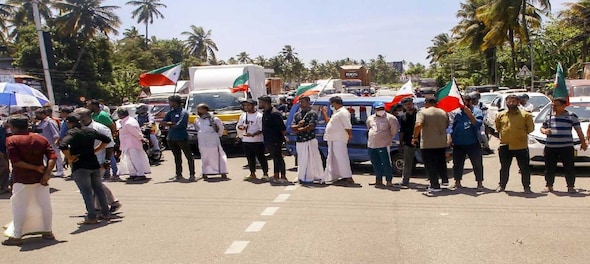
The government has banned the Popular Front of India (PFI) and sister organisations with immediate effect for a period of five years after conducting two rounds of nationwide raids and arresting more than 240 members of the outfit.
The ban comes under Section 3 of the Unlawful Activities (Prevention) Act, 1967 (37 of 1967). In a notification, the Centre also declared eight “associates, affiliates or fronts” of PFI as “unlawful association”, including Rehab India Foundation, All India Imams Council, Campus Front of India, National Women's Front, National Confederation of Human Rights Organisation, Junior Front, Empower India Foundation and Rehab Foundation, Kerala.
ALSO READ:
The ban comes after a series of crackdowns by investigative agencies such as the National Investigation Agency (NIA), Enforcement Directorate (ED) and various state/UT police on PFI.
Why was PFI banned?
In the notification, the government said PFI and its affiliates were involved in unlawful activities and terror cases and showed sheer disrespect towards the constitutional authority of the country. The government said these activities had the potential of disturbing public peace and communal harmony and supported militancy in the country.
"With funds and ideological support from outside, it has become a major threat to the internal security of the country," the Home Ministry order read, adding that the outfit had links with the Students Islamic Movement of India (SIMI), Jamat-ul-Mujahideen Bangladesh (JMB) and Islamic State or ISIS.
The ban was recommended by three states Karnataka, Gujarat and Uttar Pradesh, the ministry said.
The government said that if the PFI and its fronts were not banned, they would use the opportunity to indulge in unlawful activities, including radicalising a particular section of society.
Subversive acts
Since September 22, PFI leaders and functionaries across 15 states were raided in a coordinated move by the NIA, Enforcement Directorate and the state police. The probe agencies conducted two rounds of raids and arrested 247 people.
Investigations in various cases have revealed that the outfit and its cadres have engaged in violent and subversive acts. The outfit first came under the national radar on July 4, 2010, when its cadres chopped off the limb of a lecturer in Newman College, in Kerala’s Ernakulam district, for alleged blasphemy in preparation of examination papers, Indian Express reported.
It has been linked to cold-blooded murders of persons belonging to other faiths and obtaining explosives to target prominent people and places.
The PFI has been associated with several terrorist acts and murders, including that of R Rudresh (Karnataka, 2016), Praveen Pujari (Karnataka, 2016), Sasi Kumar (Tamil Nadu, 2016), Bibin (Kerala, 2017), Sharath (Karnataka, 2017), Abhimanyu (Kerala, 2018), V Ramalingam, (Tamil Nadu, 2019), Sanjith (Kerala, November 2021), Nandu, (Kerala, 2021), and Praveen Nettaru (Karnataka, 2022), India Today reported.
Why were the associates banned?
The government said that PFI had created associates to enhance its reach among different sections of society. The sole objective of the organisation was to use the associates to expand its membership, influence and fund-raising capacity, the government notification said.
The government termed the relationship between PFI and these associate organisations as a ‘hub and spoke’, where PFI acted as the hub and used the mass outreach and fundraising capacity of its affiliates.
Who are PFI
The PFI started as a Kerala Muslim outfit and successor to National Development Front (NDF). In 2006, the NDF morphed into the PFI. It started gaining a multi-state dimension by merging with the Karnataka Forum for Dignity and Manitha Neethi Pasarai in Tamil Nadu. In February 2009, Goa’s Citizen’s Forum, Rajasthan’s Community Social and Educational Society, West Bengal’s Nagarik Adhikar Suraksha Samiti, Manipur’s Lilong Social Forum and Andhra Pradesh’s Association of Social Justice were merged with the PFI.
First Published: Sept 28, 2022 12:29 PM IST
Check out our in-depth Market Coverage, Business News & get real-time Stock Market Updates on CNBC-TV18. Also, Watch our channels CNBC-TV18, CNBC Awaaz and CNBC Bajar Live on-the-go!


Father and son reside on same street but vote for Andhra Pradesh and Telangana separately
May 7, 2024 4:40 PM
Lok Sabha elections 2024: Radhika Khera, Shekhar Suman join BJP; meet all who are now in saffron party
May 7, 2024 3:54 PM
2024 Lok Sabha Elections | Why phase-3 is a tightrope walk for all parties
May 7, 2024 1:08 PM

